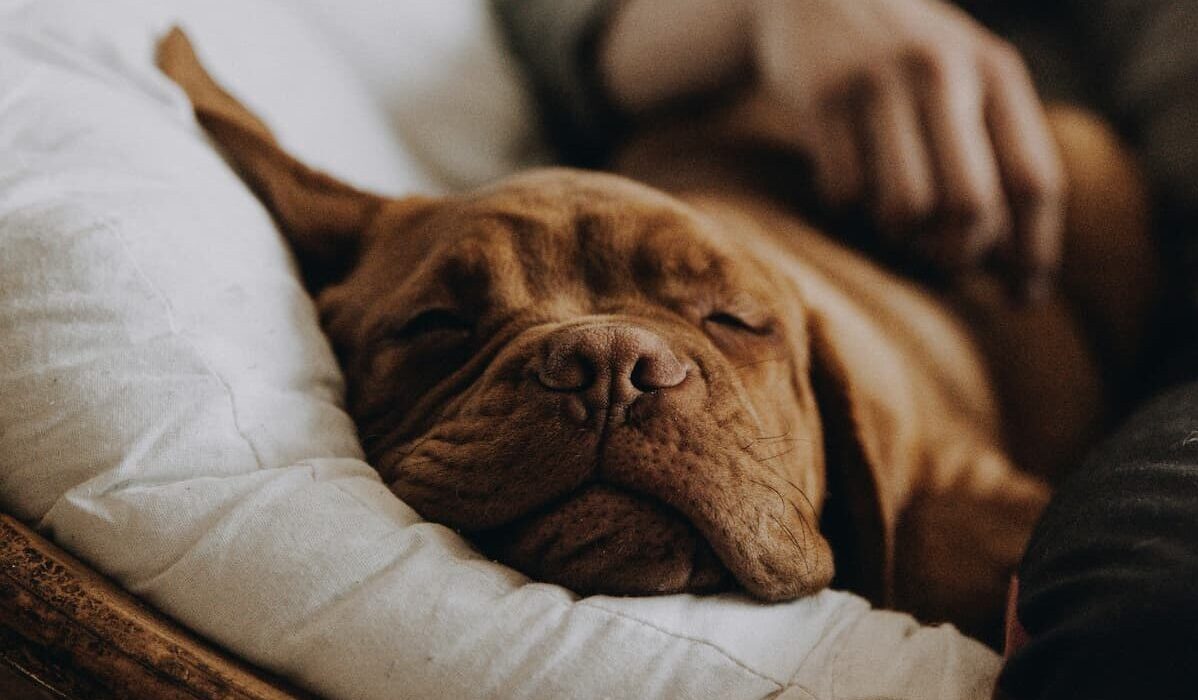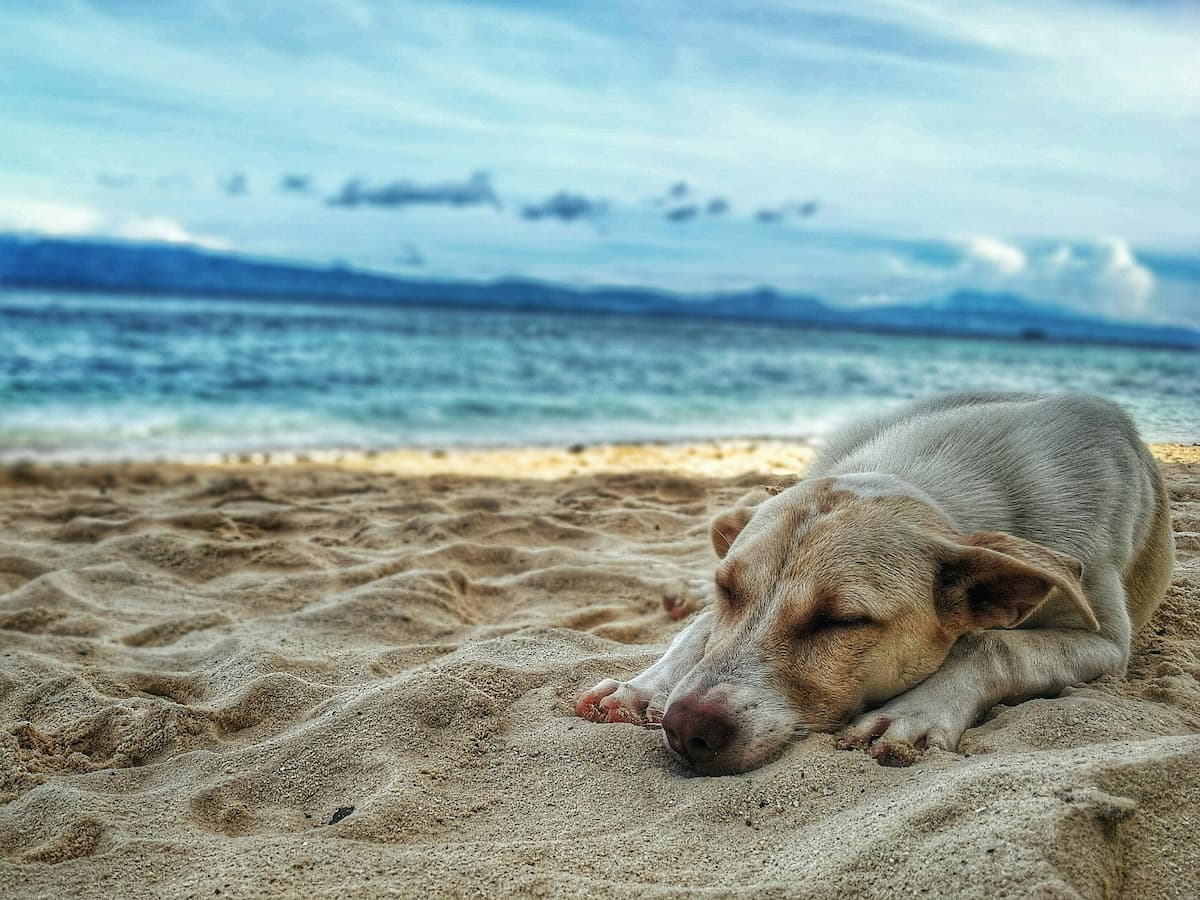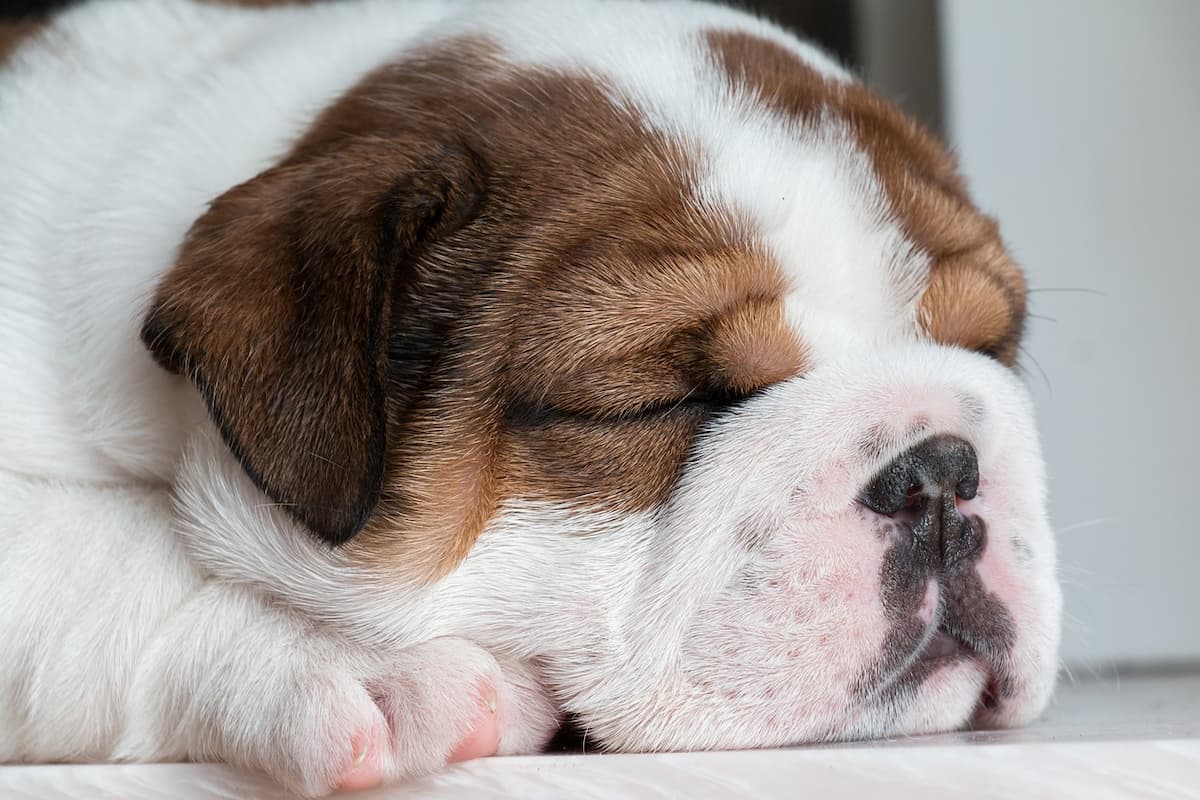Puppies are filled with boundless energy that can keep us awake at night.
But they as grow older and older, they eventually become more lethargic and start spending more time asleep.
This article will reveal the reason behind your old dog’s tiredness.
Why Do Dogs Sleep More as They Age?
Dogs are known for their love of sleep, but have you ever noticed that as they get older, they seem to snooze even more? It’s not just your imagination – there’s a scientific reason behind this increase in sleep.
Just like humans, dogs experience changes in their bodies and health as they age, which in turn affects their sleep patterns:
1. Physiological Changes: As dogs age, their bodies go through various physiological changes that can impact their sleep patterns.
For instance, their metabolism slows down, which means they require less energy and consequently sleep more as their bodies need more rest to recover and recharge, just like how we might need a little more rest when we’re feeling under the weather.
Additionally, older dogs may experience a decrease in hormone production, like melatonin, which can affect their sleep-wake cycle. These changes contribute to the increase in sleep duration.
2. Decreased Activity Levels: Another reason why dogs sleep more as they age is due to their decreased activity levels.
Older dogs may have arthritis, chronic-pain, diabetes or other age-related ailments that limit their mobility, making them less inclined to engage in vigorous activities.
With less physical exertion, it’s only natural that they will sleep more to conserve energy.
So, don’t worry if you see your old pup snoozing for longer periods; it’s just their way of adapting to their aging bodies.
3. Cognitive Function Decline: Aging affects not only a dog’s body but also their mind.
Older dogs may experience cognitive decline, similar to what humans go through in their old age.
This condition is known as Canine cognitive dysfunction syndrome (CDS) or “doggy dementia”.
Just like with Alzheimer’s disease in humans, dogs with CDS may experience confusion, disorientation, and changes in their sleep-wake cycle.
Subsequently, these dogs may exhibit restlessness at night and excessive daytime sleepiness.
It’s essential to create a comfortable and peaceful sleeping environment for your aging dog to help them get the rest they need.
Create a Cozy Sleep Space for Your Aging Dog
As our furry friends age, it’s natural for them to start sleeping more.
While you may find yourself wondering why dogs sleep so much when they get older, it’s important to understand that sleep patterns change as our pets age, just as they do for humans.
However, creating a comfortable and calming sleep environment can play a significant role in promoting better sleep for your aging dog.
Here are some tips to help you create an optimal sleep environment:
1. Choose a cozy and orthopedic bed: Investing in a high-quality orthopedic bed for your aging dog can provide the comfort and support they need for a restful sleep.
Look for a bed that is the right size for your dog and provides ample cushioning.
Orthopedic beds are especially beneficial for older dogs, as they help relieve pressure on their joints and support arthritic limbs.
2. Keep the environment quiet and peaceful: Just like humans, dogs need a quiet and peaceful environment to sleep soundly.
Avoid exposing your dog to loud noises or sudden disturbances, as they may disrupt their sleep.
Create a designated sleep area for your furry friend in a quiet corner of your home where they won’t be disturbed by household activities or external noises.
3. Establish a soothing bedtime routine: Dogs, especially as they age, thrive on routine.
Establishing a calming bedtime routine can signal to your dog that it’s time to wind down and prepare for sleep.
This can include activities such as a gentle walk, cuddling, or a soothing massage.
Avoid stimulating activities or high-energy play before bedtime, as it may make it more difficult for your aging dog to fall asleep.
Regular Exercise and Mental Stimulation Enhance Sleep Quality in Senior Dogs
Age-related changes aren’t the only reasons behind your pooch’s increased sleeping habits.
Regular exercise and mental stimulation also play a crucial role in improving the sleep quality of senior dogs and the lack of it can greatly impact their sleep patterns.
Engaging in regular exercise is vital for senior dogs to maintain their physical health and overall well-being.
By incorporating activities such as daily walks, playtime, or even swimming sessions, we can help improve their muscle tone, joint flexibility, and cardiovascular health.
Not only does exercise provide many benefits for their bodies, but it also tires them out, leading to a more restful sleep.
So, if your senior dog seems to be snoozing excessively, it might be an indicator that they aren’t getting enough physical activity throughout the day.
In addition to exercise, mental stimulation is equally important for senior dogs.
Dogs are naturally curious and intelligent creatures and providing them with mental challenges can help keep their minds sharp and engaged.
Mental stimulation can be as simple as hiding treats around the house for them to find or teaching them new tricks and commands.
Puzzles and interactive toys designed specifically for dogs are also great options to provide mental exercise.
The mental effort required keeps their brains active and engaged, preventing boredom and promoting better quality sleep at night.
It’s important to remember that every dog is unique and may have different exercise and mental stimulation needs.
Pay attention to your senior dog’s energy levels, preferences, and any age-related health conditions they may have.
Consulting with a veterinarian can help create a tailored exercise and mental stimulation plan that takes into account your dog’s specific needs.
With the right balance of physical activity and mental engagement, you can ensure your furry friend gets the quality sleep they need to remain healthy and happy in their golden years.
Supporting Your Older Dog’s Sleep Schedule with a Healthy Diet and Routine
Overall, you should already know that it’s perfectly normal for older dogs to sleep more than when they were young pups.
Just like us humans, their bodies naturally slow down as they age, and they require more rest to recharge their batteries.
They may have less energy for activities and spend more time lounging around in dreamland.
However, excessive or sudden changes in sleeping patterns could signal underlying health issues, so it’s essential to keep an eye out for any alarming signs and consult a veterinarian if necessary.
Maintaining a healthy diet is crucial for supporting your older dog’s sleep schedule.
Just like humans, a balanced and nutritious diet can positively impact their overall well-being, including their sleep quality.
Opt for high-quality dog food specially formulated for senior dogs, which typically contain ingredients that promote joint health, boost cognitive function, and aid digestion.
Remember to consult your vet for specific dietary recommendations based on your dog’s needs, as they may require additional supplements or modifications to their meal plan.
Establishing a consistent routine is another way to support your older dog’s sleep schedule.
Dogs thrive on predictability and familiarity, so try to maintain a regular daily routine for them.
This means feeding them at the same times each day, scheduling walks or playtime, and designating a calm and quiet space for them to rest.
Creating a peaceful environment by reducing noise and external distractions can also contribute to a better night’s sleep for your furry friend.
Consider providing a cozy bed with proper support to alleviate any discomfort they may experience from joint issues, ensuring they have a comfortable and inviting space to catch those much-needed Z’s.
Remember, understanding and accommodating your older dog’s changing sleep patterns is all part of the journey as a pet parent.
By providing them with the right diet, a consistent routine, and plenty of love and care, you’re helping to ensure their golden years are filled with sweet dreams and a restful sleep that they truly deserve.
FAQ
Q: Is it normal for older dogs to sleep more than when they were younger?
A: Absolutely!
Just like humans, dogs’ sleep patterns change with age.
Puppies and younger dogs are bundles of energy, running around tirelessly, exploring everything in sight.
However, as they enter their golden years, their energy levels naturally decline, and sleep becomes their new favorite pastime.
Q: How much sleep is considered excessive for older dogs?
A:Determining what’s excessive can be quite tricky since each dog is unique.
However, as a general guideline, if your elderly pup is sleeping for more than 14 to 16 hours a day, it’s a good idea to consult your veterinarian.
They can help ensure there’s no underlying health issue causing excessive sleepiness.
Q: Why do older dogs require more sleep?
A: Well, as dogs get older, their bodies go through various changes, just like ours do.
These changes can cause a decrease in their overall stamina and an increase in fatigue.
Additionally, issues such as arthritis, reduced metabolic function, and even certain medical conditions can contribute to their need for more shuteye.
Q: Does breed affect the amount of sleep older dogs need?
A: Indeed, breed does play a role in the amount of sleep our canine companions require.
Smaller breeds tend to have higher metabolic rates, which can make them more prone to napping throughout the day.
Conversely, larger breeds typically have a more laid-back demeanor but may need longer periods of deep sleep to fully rejuvenate.
Q: Should I be concerned if my senior dog sleeps too much?
A:While it’s normal for older dogs to enjoy their snooze time, excessive sleepiness could be a sign of an underlying health problem.
Keep an eye out for other concerning symptoms like weight loss, changes in appetite, or any behavioral changes.
If you notice anything out of the ordinary, it’s time to schedule a visit to the vet.
Q: Can I do anything to help my older dog sleep better?
A: Absolutely!
You can create a cozy and comfortable sleep environment for your senior pooch.
Providing a warm and soft bed, away from drafts, may help to alleviate any joint or muscle discomfort they may have.
Additionally, keeping up with regular exercise appropriate for their age can help them sleep more soundly at night.
Q: Is it alright to disturb my older dog’s sleep if they’ve been snoozing all day?
A: While we all love our furry friends and want their undivided attention, it’s essential to respect their need for rest.
Interrupting their sleep too often can be as exhausting for them as it is for us when someone keeps waking us up.
However, if you need to wake them, do so gently and give them a moment to fully wake up before asking for their attention.
So, now that you know why older dogs sleep more, you can embrace your senior furry companion’s naptime with understanding and affection.
Let them enjoy their beauty sleep and make the most out of the moments they’re awake and ready to cuddle or play.
To Wrap It Up
As they age, dogs encounter a decrease in their energy levels and a natural slowdown of bodily functions.
Just think about it, they’ve spent years bounding around, chasing balls, and exploring every corner of the park.
All that excitement takes a toll on their bodies, and as they enter their senior years, it’s only natural for them to need extra rest.
Moreover, the wear and tear on their joints can cause discomfort and make it harder for them to find a comfy position to sleep in.
They might spend more time dozing off during the day to compensate for the sleep they miss at night due to discomfort.
Do not be alarmed, however, for aging is just another part of life.
Our furry companions still enjoy their lives to the fullest, even if that involves extra napping.
As responsible pet parents, we can help by providing cozy and supportive sleeping areas to ease their joint pain.
Regular exercise appropriate for their age and condition is also crucial to keep them in good shape and maintain their energy levels.
They’ve been our steadfast friends for so long, showering us with unconditional love and making our lives brighter.
As they age gracefully, let’s cherish every moment, whether it’s playing fetch or curling up together for a peaceful afternoon nap. After all, they’ve earned it.













